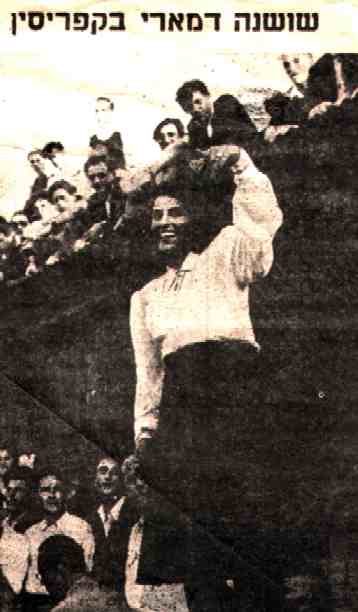 Shoshana Damari, with a completely distinctive voice, and a career as one of Israel’s favorite singers, died on Tuesday, February 14, 2006 at a hospital in Israel from pneumonia. She was 83. Damari was called by Haaretz newspaper as the “Queen of Israeli Song” , others the “diva of popular song”. Damari was born in Yemen, in the city of Damar, migrating with her family to Israel in 1924. She was a child prodigy and sang at many functions in her community. As a young teenager, she went to seek her career in Tel Aviv, landing a job at the Li-La-Lo Theater and becoming a permanent cast member. One of her solo numbers was by Shlomo Wilenski, called “Kalaniot” (Anemones) and it became her signature song. The hospital reported that this song was played for her minutes before her death with friends and family singing along. Damari’s songs became identified with the Israel War of Independence of 1948. She was widely honored and beloved in Israel, winning the Israel Prize in 1988. This musician will be buried with a state funeral. Read Israel newspapers about it: http://www.haaretzdaily.com/hasen/spages/682676.html And the Jewish Agency biography: http://www.jewishagency.org/JewishAgency/English/Jewish+Education/Eye+on+Israel/Gallery+of+People+%28Biographies%29/Damari+Shoshana.htm
Shoshana Damari, with a completely distinctive voice, and a career as one of Israel’s favorite singers, died on Tuesday, February 14, 2006 at a hospital in Israel from pneumonia. She was 83. Damari was called by Haaretz newspaper as the “Queen of Israeli Song” , others the “diva of popular song”. Damari was born in Yemen, in the city of Damar, migrating with her family to Israel in 1924. She was a child prodigy and sang at many functions in her community. As a young teenager, she went to seek her career in Tel Aviv, landing a job at the Li-La-Lo Theater and becoming a permanent cast member. One of her solo numbers was by Shlomo Wilenski, called “Kalaniot” (Anemones) and it became her signature song. The hospital reported that this song was played for her minutes before her death with friends and family singing along. Damari’s songs became identified with the Israel War of Independence of 1948. She was widely honored and beloved in Israel, winning the Israel Prize in 1988. This musician will be buried with a state funeral. Read Israel newspapers about it: http://www.haaretzdaily.com/hasen/spages/682676.html And the Jewish Agency biography: http://www.jewishagency.org/JewishAgency/English/Jewish+Education/Eye+on+Israel/Gallery+of+People+%28Biographies%29/Damari+Shoshana.htm
Her death marks yet another of the founding generation’s passing in recent years along with Uzi Hitman (Chitman), Naomi Shemer, and Ehud Manor.
Shalom Eitan has a biography of his escape from the Holocaust and arrival in Israel. While in a British detention camp on Cyprus, around 1947-48, Shoshana Damari came to sing. Here’s a small, but poignant quote from that article that gives a glimpse of the power Damari had the meaning of her work to that generation:
“Life in the camp began to fill with meaning. The course, my job, the cultural life which was expanding, soccer, volleyball and the like. Even a Yiddish theatre came into existence. We were in a detainment camp but it was more like a vacation camp. There were parties and weddings. Children were born and there was no worry about supporting them. Everything, except for the inability to reach Israel, was OK One of the most moving events was the performance of Shoshana Damari. Every detainee in the summer camp gathered on the soccer field where a stage had been built in the centre. On the stage stood a beautiful, dark-skinned woman like those seen only rarely in Europe. Very tanned with wonderful black hair; but most of all, the voice. Her songs electrified us and even though her accompanist did not manage to work the accordion, which apparently had been damaged during its travels. She hypnotised us with her songs and gave a complex to anyone who thought he or she knew how to speak Hebrew.
I was educated speaking Hebrew with Sephardic style and even so, it was the first time I heard authentic Hebrew. I didn’t even know there were Ashkenasi Jews and Sephardic Jews until I reached Bucharest. There I learned that the Sephardic Jews were the elite of the people and they descended directly from King David’s kingdom and after the destruction of the second temple, were deported or compelled by circumstances to leave their home land to the Diaspora then lived a flourishing period in Spain until the expulsion by and during the Spanish Inquisition.
In Cyprus, I met Jews from Morocco and Shoshana Damari exemplified the Jews in Israel. Only later did I learn that she was from Yemen. The melodies of her songs accompanied me for years to come and even though I have heard her sing tens, if not hundreds of times, her songs still remind me of that unforgettable experience in Cyprus. In the television show, “This Is Your Life,” I heard her say that the most emotional event in her long, rich career was “the performance she gave, the songs she sang before the refugees in Cyprus.” How very true! ”
To read Eitan’s full article go to the JewishGen website: http://www.jewishgen.org/Yizkor/lipkany/lipkany.html#TOC and click on “Survive and Tell”
 Shoshana Damari in Cyprus at British Camp of Jewish Detainees circa 1947.
Shoshana Damari in Cyprus at British Camp of Jewish Detainees circa 1947.
Photo credit: Shalom Eitan from JewishGen.
